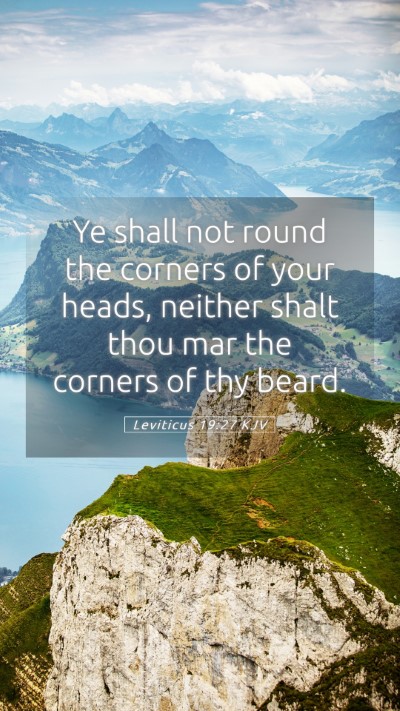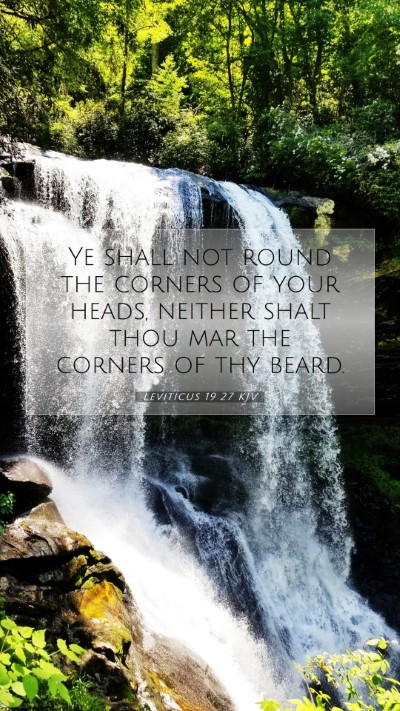Understanding Leviticus 19:27
Bible Verse: Leviticus 19:27
"You shall not round off the hair on your temples or destroy the edges of your beard."
Overview
This verse is part of the Holiness Code found in Leviticus, which outlines God's principles for living a holy life. Leviticus 19:27 specifically addresses certain grooming practices that were associated with pagan rituals. This verse serves as a reminder of the importance of distinguishing the practices of God's people from those of surrounding nations.
Commentary Insights
-
Matthew Henry:
Matthew Henry emphasizes that this command reflects God's care for the distinctiveness of His people. The prohibition against particular grooming habits was intended to protect the Israelites from adopting the customs of idolatrous nations, advocating for a lifestyle that honors God.
-
Albert Barnes:
Albert Barnes explains that the directive not to round off the hair on the temples or destroy the edges of the beard served as a physical representation of one's commitment to God's covenant. These external signs were to ensure that the community remained focused on their identity as children of God and separate from pagan practices.
-
Adam Clarke:
Adam Clarke provides historical context, noting that some ancient cultures partook in these grooming practices as part of their worship. He stresses that the instruction was not merely about physical appearance but also about maintaining spiritual purity and allegiance to God, highlighting the need for discerning cultural practices.
Biblical Exegesis
In understanding this scripture, it is crucial to analyze its historical and cultural context. The Israelites lived among nations that engaged in various idolatrous rites, including specific haircuts and shavings as offerings to idols. Hence, this verse emphasizes the importance of cultural identity for God's people, encouraging them to maintain their unique practices as a form of worship and obedience to God.
Significance in Scripture
This commandment is part of a broader theme of holiness, where God seeks to set apart His people for His purposes. These grooming laws were less about strict legalism and more about fostering a lifestyle that reflects God's character.
Practical Applications
Today, while we may not be bound by the grooming laws of Leviticus, the principle of living distinct from surrounding cultures still applies. Believers are called to reflect Christ in all aspects of life, making choices that honor God and represent His kingdom well.
Additional Bible References
- Deuteronomy 14:1-2 - Discusses the distinctiveness of the Israelites.
- 1 John 2:15-17 - Warns against loving the world and its practices.
- 1 Peter 2:9 - Describes believers as a holy nation and a royal priesthood.
Conclusion
Leviticus 19:27 serves as a foundational text for understanding the call to holiness among God's people. The examination of this verse reveals the deep significance behind seemingly simple grooming instructions. By appreciating the historical context and the motivations behind these commands, we find valuable insights for our own spiritual journey.
Further Study Recommendations
If you are involved in Bible study groups or looking to deepen your understanding through online Bible study resources, consider further studies on:
- Bible study lessons on Leviticus.
- In-depth Bible verse analysis of Old Testament laws.
- Understanding difficult Bible passages in light of God's character.


